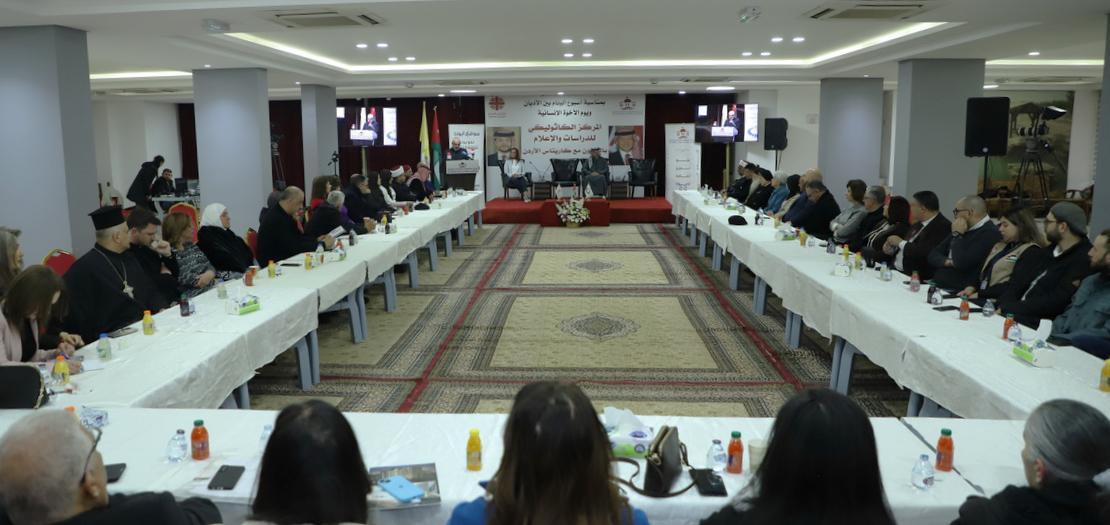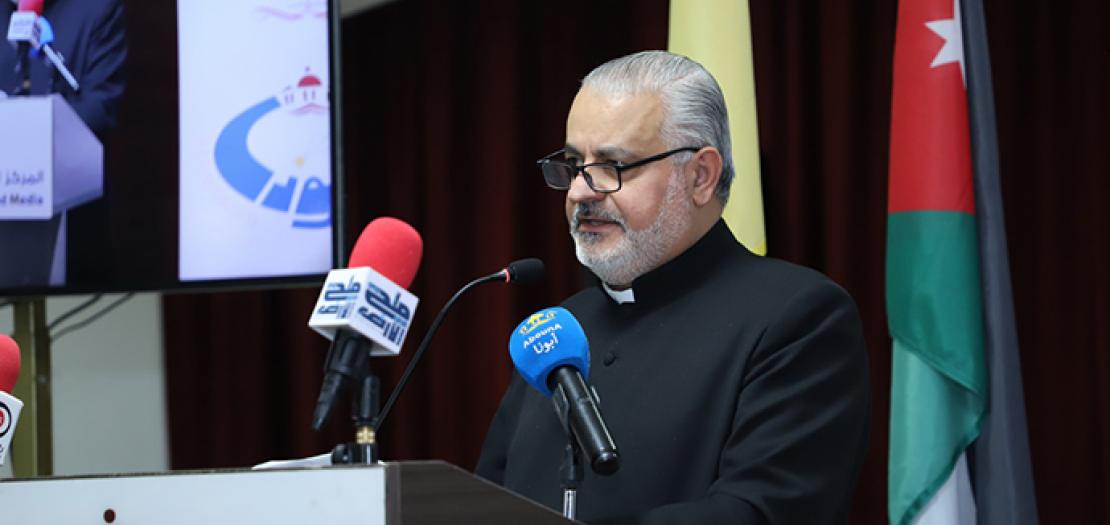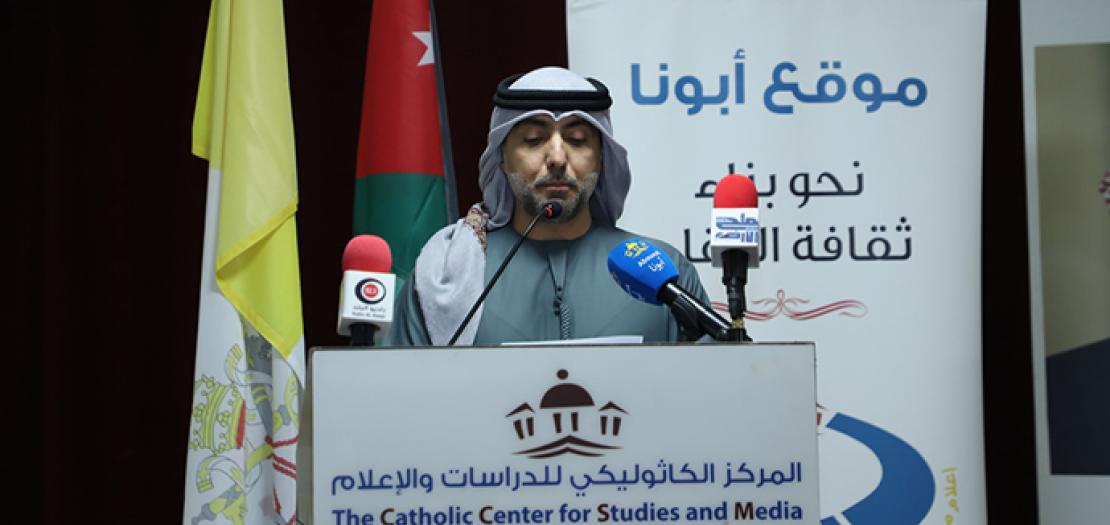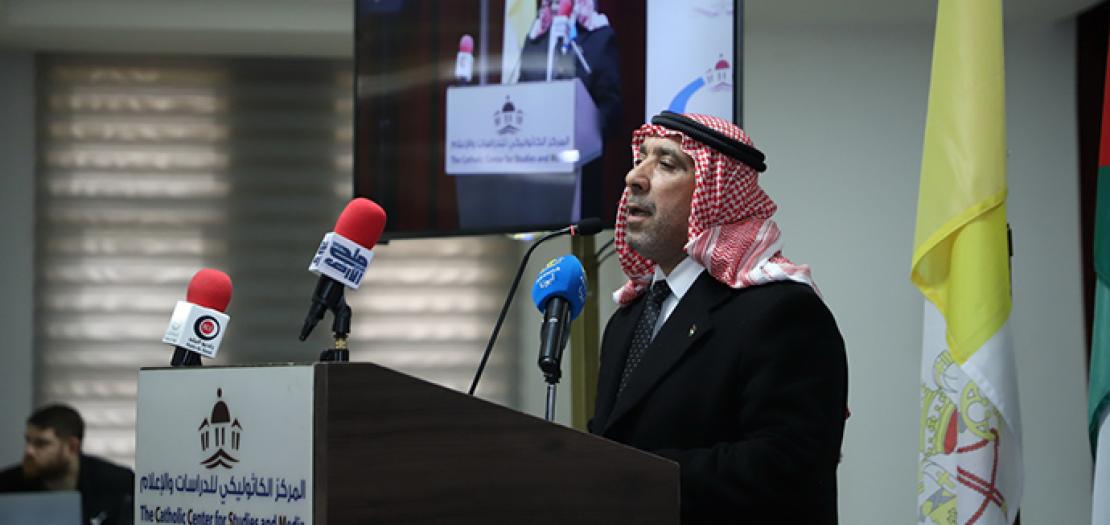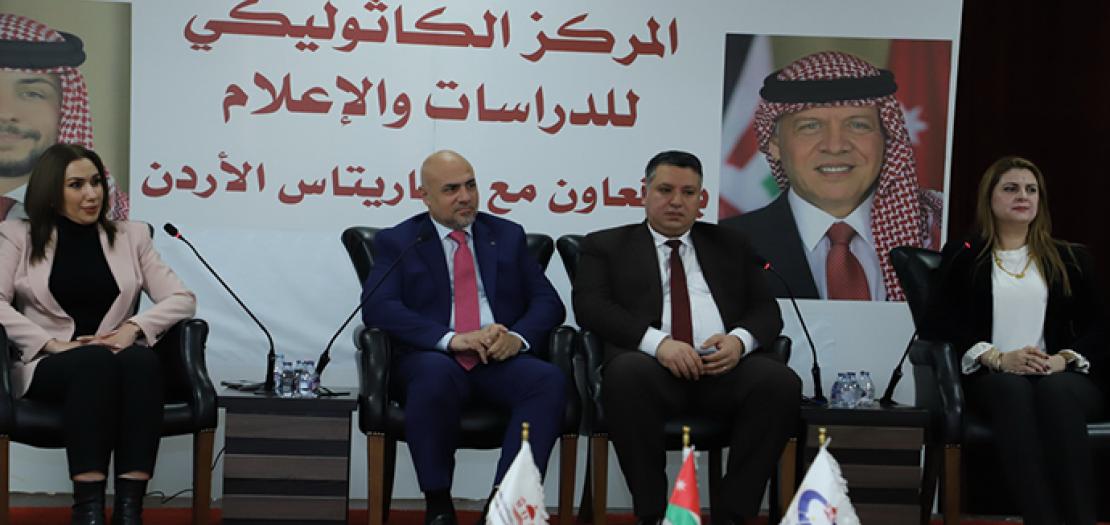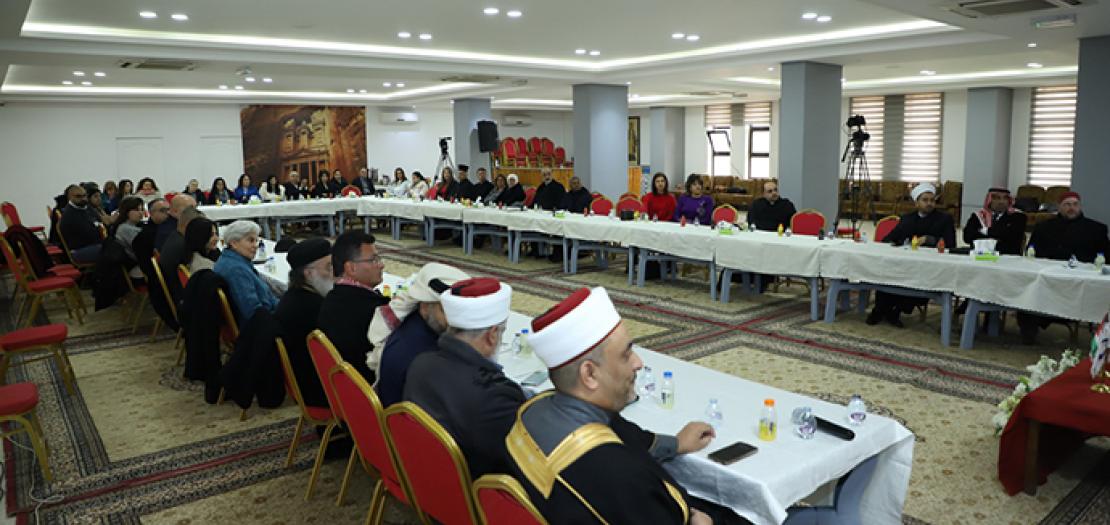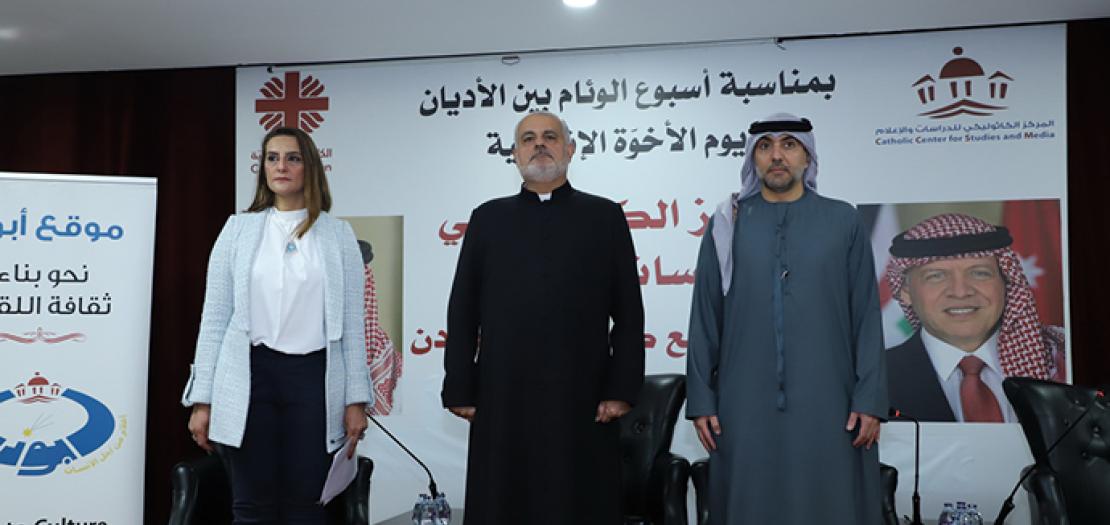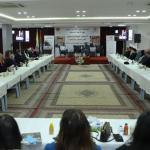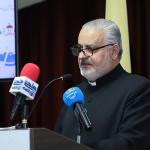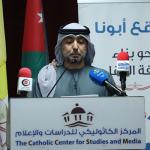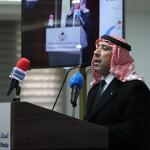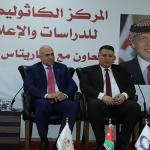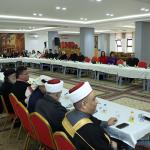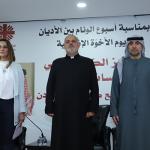CCSM holds seminar marking World Interfaith Harmony Week, Int’l Day of Human Fraternity
On Thursday, February 13, 2025, the Catholic Center for Studies and Media (CCSM) in Jordan, in partnership with Caritas Jordan, marked the 15th anniversary of the World Interfaith Harmony Week and the 5th anniversary of the International Day of Human Fraternity by holding a seminar that highly valued the efforts undertaken by His Majesty King Abdullah II in making peace which is the other face of the coin, namely of harmony that is based on justice, legitimate rights, and the noble human values.
The seminar, held at Karam Imsih Hall, which is affiliated with the Sacred Heart of Jesus Church in Tla’ Al-Ali, western Amman, was attended by Chargé d’Affairs of the UAE Embassy Hamad Al-Matroushi, Ambassador of the Tunisian Republic Ms. Mufida Al-Zaribi, Deputy Ambassador and Minister Plenipotentiary at the Embassy of the Kingdom of Bahrain Mr. Hussein Al Mahmoud, as well as representatives of the Ministry of Awqaf and Islamic Affairs, of the Ifta’ Department, of the Department of the Chief Justice, heads of churches, priests and nuns, academic and media figures, in addition to a number of activists in interfaith and intercultural dialogue.
The opening session, which began with playing the national anthem and moderated by researcher in studies relevant to war and peace Ms. Shireen Mashaqbeh, was followed by a recitation from the Holy Bible by Father Ala’ Ba’ir and another recitation from the Holy Koran by Sheikh Abdullah Abu Ghazaleh. Then, CCSM Director Fr. Dr. Rif’at Bader delivered an address in which he praised the good and blessed efforts undertaken by His Majesty King Abdullah II in the context of dialogue and harmony which is associated with peace among nations and peoples.
Fr. Bader stressed that the wise Jordanian diplomacy led by His Majesty the King is steadfast and clear which places the interests of Jordan and Jordanians at the top of the priorities, and calls for enabling the Palestinian people to obtain all their legitimate rights by rejecting any proposals or attempts to remove them from their land, as well as by pushing for the attainment of ceasefire and providing humanitarian aid in Gaza, at a time when peace according to His Majesty the King implies just peace, otherwise there will be no peace.
The CCSM director said: “We are experiencing nowadays genuine national unity between the leader and his people, so Jordanians lined up the streets to receive His Majesty the King after undertaking an important historic and political trip through which he wanted to express the permanent Jordanian position on the Palestinian issue, while focusing on harmony and cohesion among sisterly Arab countries.” He added that we declare our absolute support for all peace efforts undertaken by His Majesty the King and His Royal Highness Crown Prince Al- Hussein Ibn Abdullah, as well as all Arab leaders and friends everywhere who stand in these days united in the face of the displacement and intimidation of the dear Palestinian people.
Fr. Bader referred to the good initiatives that were launched during the reign and under the patronage of His Majesty the King including the Amman Message, the Common Word Initiative, and the World Interfaith Harmony Week which was adopted by the United Nations, and the World Conference on Arab Christian Identity, whereby all of which are Hashemite Jordanian initiatives that entrenched Jordan as a model of brotherhood, as well as underlined its global role and mission in promoting the values of harmony and peace.
Fr. Bader expressed his pride of Jordan, which has deep-rooted religious roots, both Christian and Islamic, while referring to the Jordanian exhibition being held in Rome under a distinctive title, namely “Jordan, the Dawn of Christianity” which confirms that Jordan is a holy land that witnessed the launch of the Christian message following the baptism of Lord Jesus Christ in the Jordan River. He stressed that it is also deep-rooted in the ancient Islamic roots in this country which converges and embraces the Christian roots that are watered by the blessed waters of the river in harmony and beautiful brotherhood under the pure soil of Jordan.
For his part, Chargé d’Affairs of the UAE Embassy Hamad Al-Matroushi touched on the good efforts exerted by the UAE in enrooting the values of love, tolerance, and harmony among religions, including the document on Human Fraternity for World Peace and Living that was signed by His Holiness Pope Francis and His Eminence Sheikh of Al-Azhar Ahmed Al-Tayeb, years ago in Abu Dhabi, which represents a joint declaration that urges following the path of peace among people in the world, a matter that was adopted on by the United Nations since 2020, to be marked annually as an international day of human fraternity.
Al-Matroushi pointed out that these humanitarian initiatives reflect the living image of the UAE’s vibrant society, which includes citizens of more than 200 countries, and indicate that the role of UAE institutions, such as the Ministry of Tolerance and Coexistence, are important in implementing policies and programs designed to enhance cooperation and to bridge cultural gaps. He praised the pioneering Jordanian model of common living and harmony among the various components of the community of the noble country.
Dr. Sultan Al-Qaraleh, head of the Anti-Extremism Department at the Ministry of Awqaf and Islamic Affairs, also delivered an address in which he explained that Jordan is a country of great potential, love and harmony that unites rather than divides, while enhancing love and harmony among its social fabric with all its shades, that rally behind the leader of the country, His Majesty King Abdullah II, exposing loyalty and affiliation with Jordan. He said: “Lead us, Abu Al-Hussein, for we are with you, with you we will continue the procession, and we will continue to express pride of you to the world with your heroic and courageous positions, which express the extent of our pride in this enlightened Hashemite thought.”
He also cited His Majesty the King’s speech at the Islamic Heritage Conference in 2018: “To understand each other, to recognize our shared humanity, to act righteously in the sight of god; this is the major principles of Islam.” He also stressed that the Ministry of Awqaf realizes the importance of religious discourse, and is capable of achieving its mission with the reform and humanitarian tools it possesses, such as the “Amman Message”, “ the Common Word Initiative,” and the “World Interfaith Harmony Week.”
The seminar included a session moderated by journalist and political activist Dr. Safa’ Samadi during which former Minister of Awqaf Dr. Wael Arabiyat stressed that harmony is part of the structure of the Jordanian society, which was strengthened by the Hashemite political system. He also touched on the need for children to be raised in a way that instills the meaning of association with their religion in the first place, acceptance of others, establishing just foundations for promoting peace and stability in the region based on rights, the importance of the attainment of Arab unity, and the need for an Islamic-Christian unity in the East, and an Islamic-Christian global unity to confront the challenges facing the region. He also emphasized that harmony is closely linked to peace.
Executive Director of Talal Abu-Ghazaleh & Co. Consulting Mr. Ibrahim Abu Naffa, also spoke about the developments that have taken place in the field of dialogue which transcend from calls on individual figures to programs based on intellectual, scientific and dialogue institutions and platforms that function to promote noble human values in the youth and new generations.
Writer and political analyst Dr. Rawan Al-Hiari addressed the role of Jordanian women in instilling the values of dialogue and diversity. She noted that the challenges facing the region represent a need for vociferously calling for building bridges of understanding and dialogue among religions, instead of waging waves of hatred and extremism. She also stressed that true peace is not merely based on treaties or agreements, but rather on a culture based on mutual respect.
The session was followed by a discussion between the attendees and the speakers on ways to enhance the values of harmony and mutual respect in our Arab societies, during which they praised Jordan’s role in instilling the values of convergence and harmony at the local, Arab, and international levels.

